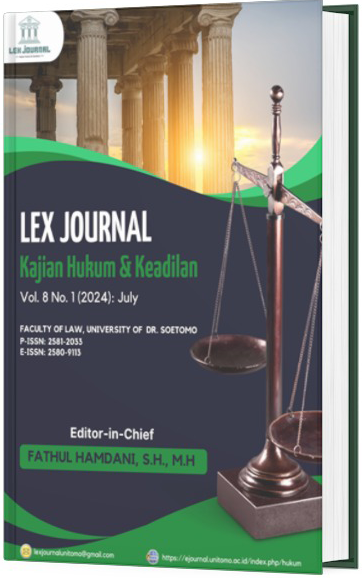Concept of Restorative Justice in the Crime of Money Laundering which is detrimental to the State due to Corruption Crimes
 Abstract views: 85
,
Abstract views: 85
,
 PDF downloads: 86
PDF downloads: 86
Abstract
Every country has the right to resolve money laundering cases through restorative justice in returning assets as an effort to recover state financial losses resulting from criminal acts of corruption through the United Nations Convention Against Corruption (UNCAC) which is signed by 133 countries. The aim of this research is to analyze how the concept of restorative justice is applied in money laundering crimes which are detrimental to the State due to the increasing number of criminal acts of corruption in Indonesia. The type of research used is normative legal research using a statutory approach and a conceptual approach. The results of this research are that the application of the concept of restorative justice in the crime of money laundering which is detrimental to the State due to criminal acts of corruption can be applied in Indonesia as long as it does not conflict with Law Number 20 of 2001 concerning Amendments to Law Number 31 of 1999 concerning Eradication of Crimes. Corruption Crime. Rules related to the concept of Restorative Justice are contained in the Circular Letter of the Deputy Attorney General for Special Crimes Number: B113/F/Fd.1/05/2010 dated 18 May 2010 and the Letter of the Chief of Police No. Pol. B/3022/XII/2009 concerning the concept of Alternative Dispute Resolution.
References
BOOKS
Darwin, Philips, Money Laundering â€Cara Memahami Dengan Tepat dan Benar Soal Pencucian Uang†(Jakarta: Sinar Ilmu, 2012).
Irman, Tb, Hukum Pembuktian Pencucian Uang (Money Laundering) (Bandung: MQS Publishing & AYYCCS Group, 2006).
Marsita, BD Sri & Sri Humana, Penyelesaian Perkara Tindak Pidana korupsi Yang Nilai Kerugian Keuangan Negaranya Kecil (Depok: Raja Grafindo Persada, 2015).
Pujiyono, Tindak Pidana Korupsi Universitas Terbuka, 2021) [unpublished].
Purwoleksono, Didik Endro, Hukum Pidana, 1st ed (Surabaya: Airlangga University Press, 2016).
Pusat Bahasa Departemen Pendidikan Nasional, Kamus Bahasa Indonesia (Jakarta: Departemen Pendidikan Nasional, 2008).
JOURNAL
Ashalirrohman, Yusron, ‘Asset Forfeiture for the Offense of Illicit Enrichment: Between Eradication and Deterrence’ (2024) 8:1 Lex J Kaji Huk dan Keadilan 1–12.
Fauzia, Ana & Fathul Hamdani, ‘Analysis of the Implementation of the Non-Conviction-Based Concept in the Practice of Asset Recovery of Money Laundering Criminal Act in Indonesia from the Perspective of Presumption of Innocence’ (2021) 11:1 J Jurisprud 57–67.
Hamdani, Fathul, ‘Eksistensi Penerapan Hukuman Mati Bagi Koruptor dalam Konteks Hukum di Era Modern’ in Achmad Hariri, ed, Penegakan Korupsi dan Pembaharuan Huk di Indones (Surabaya: UM Surabaya Publishing, 2021) 56.
Hestaria, Helena, Made Sugi Hartono & Muhamad Jodi Setianto, ‘Tinjauan Yuridis Penerapan Prinsip Restorative Justice Terhadap Tindak Pidana Korupsi Dalam Rangka Penyelamatan Keuangan Negara’ (2022) 5:3 J Komunitas Yust 112–128.
Hiariej, Eddy OS, ‘United Nations Convention Against Corruption dalam Sistem Hukum Indonesia’ (2019) 31:1 Mimb Huk 112–125.
Nasution, Nurul Putri Awaliah, Jubair & Abdul Wahid, ‘The Concept of Restorative Justice in Handling Crimes in the Criminal Justice System’ (2022) 1:5 Eur J Law Polit Sci 32–41.
Roesnajanti, Enni, ‘Penerapan Azas Pembalikan Beban Pembuktian Tindak Pidana Pencucian Uang (Studi Putusan Mahkamah Agung RI No. 1454 K/Pid.Sus/2011 dan Putusan Pengadilan Negeri Lamongan No.262/Pid.Sus/2017/PN LMG)’ (2020) 4:2 Lex J Kaji Huk dan Keadilan 211–233.
Sudirman, Antonius, ‘Eksistensi Pidana Minimum Khusus Sebagai Sarana Penanggulangan Tindak Pidana Korupsi’ (2015) 44:3 Masal Huk 316–325.
Suhariyanto, Budi, ‘Restorative Justice dalam Pemidanaan Korporasi Pelaku Korupsi demi Optimalisasi Pengembalian Kerugian Keuangan Negara’ (2016) 5:3 J Rechts Vinding Media Pembin Huk Nas 421–438.
WEBSITE
Annur, Cindy Mutia, ‘KPK Tangani 161 Kasus Korupsi pada 2023, Gratifikasi Terbanyak’, (2024), online: Kata Data <https://databoks.katadata.co.id/datapublish/2024/03/06/kpk-tangani-161-kasus-korupsi-pada-2023-gratifikasi-terbanyak>.
Ginarsih, Yenti, Tindak Pidana Pencucian Uang: Dalam Teori dan Praktek (Mahupiki and University of Sebelas Maret, 2013).
Humas BPHN, ‘Tindak Pidana Pencucian Uang Jadi Tantangan Penegakan Hukum Tindak Pidana Korupsi di Indonesia’, (2023), online: Badan Pembin Huk Nas <https://bphn.go.id/publikasi/berita/2023051601591781/tindak-pidana-pencucian-uang-jadi-tantangan-penegakan-hukum-tindak-pidana-korupsi-di-indonesia>.
Muslim, Fithriadi & Edi Nasution, Menjerat Koruptor Dengan Undang-Undang Tindak Pidana Pencucian Uang (Padang, 2011).
Naurah, Nada, ‘Menilik Kasus Pencucian Uang di Indonesia, Ini Statistiknya!’, (2023), online: Good Stats <https://goodstats.id/article/menilik-kasus-pencucian-uang-di-indonesia-ini-statistiknya-lonv4>.
Yusuf, Muhammad, Ikhtisar Ketentuan Pencegahan dan Pemberantasan Tindak Pidana Pencucian Uang, by Muhammad Yusuf (Jakarta, 2011).
Copyright (c) 2024 Ihda Aniqoh, Bagus Dwi Kurniawan, Thanh Nga Pham

This work is licensed under a Creative Commons Attribution-ShareAlike 4.0 International License.








